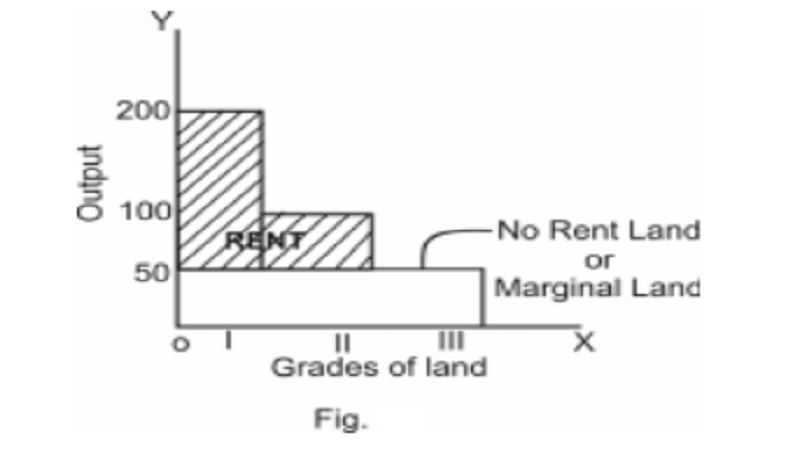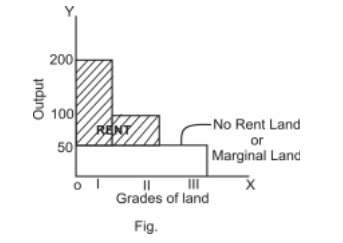Chapter: 11th 12th std standard Indian Economy Economic status Higher secondary school College
The Ricardian theory of Rent

Rent
In ordinary language, 'rent' refers to any periodic payment made for the use of a good. For example, when we live in someone's house, we pay rent. This rent is contract payment. The contract rent includes besides the payment made for the use of land, interest on the capital invested in the house, wages and profit. But classical economists like Ricardo referred by 'rent' to the payment made for the use of agricultural land. Rent arises because of the peculiar characteristics of land. The supply of land is inelastic and it differs in fertility. Rent arises because of differences in fertility. Those lands which are more fertile than others get rent.
The Ricardian theory of Rent
Ricardian theory of rent is one of the earliest theories of rent. It is named after Ricardo, a great classical economist of the 19thcentury.
According to Ricardo, 'rent is that portion of the produce of the earth which is paid to the landlord for the use of the original and indestructible powers of the soil'. So rent is payment made for the use of land for its original powers. Ricardo believed that rent arose on account of differences in the fertility of land. Only superior lands get rent. Rent is a differential surplus.
Rent may also arise on account of situational advantage. For example, some lands may be nearer to the market. The producer can save a lot of transport costs. Even if all lands are equally fertile, lands which enjoy situational advantage will earn rent.
Ricardo explained his theory by taking the example of colonization. If some people go and settle down in a place, first they will cultivate the best lands. If more people go and settle down, the demand for land will increase and they will cultivate the second-grade lands. The cost of production will go up. So the price of grain in the market must cover the cost of cultivation. In this case, the first grade land will get rent. After some time, if there is increase in population, even third grade lands will be cultivated. Now, even second grade lands will get rent and first grade lands will get more rent but the third grade land will not get rent. It is known as no - rent land. According to Ricardo, rent is price determined, that is, it is determined by price of the grains produced in the land. He also believed that rent is high because price is high and not the other way round. Ricardo came to the conclusion that rent did not enter price because there are some no - rent or marginal lands. As the produce of no-rent land gets a price, Ricardo argued that rent did not enter price.

In figure , grades of land are shown along the X axis and the output up the y - axis. The shaded area in the diagram indicates rent. In this case, grade I and grade II lands get rent. The grade III land will not get rent.
Criticism of the Ricardian Theory of Rent
Ricardo tells that only the best lands are cultivated first. There is no historical proof for this.
1. According to Ricardo, land has 'original and indestructible powers'. But the fertility of land may decline after some time because of continuous cultivation.
1. Ricardo believed that rent is peculiar to land alone. But many modern economists argue that the rent aspect can be seen in other factors like labour and capital. Rent arises whenever the supply of a factor is inelastic in relation to the demand for it.
2. Ricardo is of the view that rent does not enter the price of the commodity produced in it. But rent enters the price from the point of view of a single firm.
3. Ricardian theory does not take note of scarcity rent.
4. It is based on perfect competition. Only under perfect competition, there will be one price for a good. But in the real world, we have imperfect competition.
Though there are some criticisms against the Ricardian theory, we may note it tells that because of increasing pressure on land, we have to cultivate inferior lands.
Related Topics